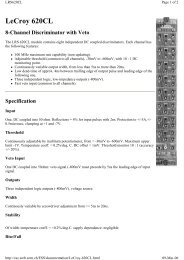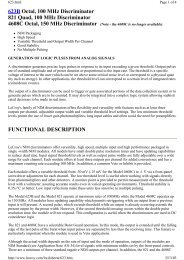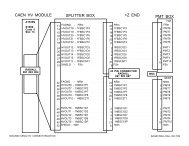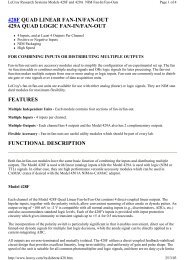- Page 4: CAMBRIDGE MONOGRAPHS ON PARTICLE PH
- Page 10: PARTICLE DETECTORS Second Edition C
- Page 14: Contents Preface to the second edit
- Page 18: Contents ix 6.10 Radiophotoluminesc
- Page 22: Contents xi 14.6.1 Thermal (Johnson
- Page 26: Preface to the second edition Scien
- Page 30: References xv References [1] K. Kle
- Page 34: Preface to the first edition xvii o
- Page 38: References xix [22] W. Stolz, Messu
- Page 42: Introduction xxi Scintillations in
- Page 46: References xxiii [3] Lord Kelvin,
- Page 52:
2 1 Interactions of particles and r
- Page 56:
4 1 Interactions of particles and r
- Page 60:
6 1 Interactions of particles and r
- Page 64:
8 1 Interactions of particles and r
- Page 68:
10 1 Interactions of particles and
- Page 72:
12 1 Interactions of particles and
- Page 76:
14 1 Interactions of particles and
- Page 80:
16 1 Interactions of particles and
- Page 84:
18 1 Interactions of particles and
- Page 88:
20 1 Interactions of particles and
- Page 92:
22 1 Interactions of particles and
- Page 96:
24 1 Interactions of particles and
- Page 100:
26 1 Interactions of particles and
- Page 104:
28 1 Interactions of particles and
- Page 108:
30 1 Interactions of particles and
- Page 112:
32 1 Interactions of particles and
- Page 116:
34 1 Interactions of particles and
- Page 120:
36 1 Interactions of particles and
- Page 124:
38 1 Interactions of particles and
- Page 128:
40 1 Interactions of particles and
- Page 132:
42 1 Interactions of particles and
- Page 136:
44 1 Interactions of particles and
- Page 140:
46 1 Interactions of particles and
- Page 144:
48 1 Interactions of particles and
- Page 148:
50 1 Interactions of particles and
- Page 152:
52 1 Interactions of particles and
- Page 156:
54 1 Interactions of particles and
- Page 160:
2 Characteristic properties of dete
- Page 164:
58 2 Characteristic properties of d
- Page 168:
60 2 Characteristic properties of d
- Page 172:
62 2 Characteristic properties of d
- Page 176:
64 2 Characteristic properties of d
- Page 180:
66 2 Characteristic properties of d
- Page 184:
68 2 Characteristic properties of d
- Page 188:
70 2 Characteristic properties of d
- Page 192:
72 3 Units of radiation measurement
- Page 196:
74 3 Units of radiation measurement
- Page 200:
76 3 Units of radiation measurement
- Page 204:
78 3 Units of radiation measurement
- Page 208:
80 3 Units of radiation measurement
- Page 212:
4 Accelerators The ‘microscopes
- Page 216:
84 4 Accelerators magnets has allow
- Page 220:
86 4 Accelerators φ = σ · NA [mo
- Page 224:
88 4 Accelerators If the electron c
- Page 228:
5 Main physical phenomena used for
- Page 232:
92 5 Main physical phenomena used f
- Page 236:
94 5 Main physical phenomena used f
- Page 240:
96 5 Main physical phenomena used f
- Page 244:
98 5 Main physical phenomena used f
- Page 248:
100 5 Main physical phenomena used
- Page 252:
102 5 Main physical phenomena used
- Page 256:
104 5 Main physical phenomena used
- Page 260:
106 5 Main physical phenomena used
- Page 264:
108 5 Main physical phenomena used
- Page 268:
110 5 Main physical phenomena used
- Page 272:
112 5 Main physical phenomena used
- Page 276:
114 5 Main physical phenomena used
- Page 280:
116 5 Main physical phenomena used
- Page 284:
118 5 Main physical phenomena used
- Page 288:
120 5 Main physical phenomena used
- Page 292:
122 5 Main physical phenomena used
- Page 296:
124 5 Main physical phenomena used
- Page 300:
126 5 Main physical phenomena used
- Page 304:
128 5 Main physical phenomena used
- Page 308:
130 5 Main physical phenomena used
- Page 312:
132 5 Main physical phenomena used
- Page 316:
134 5 Main physical phenomena used
- Page 320:
136 5 Main physical phenomena used
- Page 324:
138 5 Main physical phenomena used
- Page 328:
140 5 Main physical phenomena used
- Page 332:
142 5 Main physical phenomena used
- Page 336:
144 5 Main physical phenomena used
- Page 340:
146 5 Main physical phenomena used
- Page 344:
148 5 Main physical phenomena used
- Page 348:
150 5 Main physical phenomena used
- Page 352:
152 5 Main physical phenomena used
- Page 356:
154 5 Main physical phenomena used
- Page 360:
156 5 Main physical phenomena used
- Page 364:
158 5 Main physical phenomena used
- Page 368:
6 Historical track detectors A man
- Page 372:
162 6 Historical track detectors Fi
- Page 376:
164 6 Historical track detectors ov
- Page 380:
166 6 Historical track detectors or
- Page 384:
168 6 Historical track detectors Th
- Page 388:
170 6 Historical track detectors Fi
- Page 392:
172 6 Historical track detectors Be
- Page 396:
174 6 Historical track detectors In
- Page 400:
176 6 Historical track detectors co
- Page 404:
178 6 Historical track detectors In
- Page 408:
180 6 Historical track detectors Th
- Page 412:
182 6 Historical track detectors [9
- Page 416:
184 6 Historical track detectors [5
- Page 420:
7 Track detectors Some scientists f
- Page 424:
188 7 Track detectors Avalanche for
- Page 428:
190 7 Track detectors For a reliabl
- Page 432:
192 7 Track detectors Fig. 7.6. Wor
- Page 436:
194 7 Track detectors t 2 particle
- Page 440:
196 7 Track detectors Initial diffi
- Page 444:
198 7 Track detectors p of charged
- Page 448:
200 7 Track detectors (a) (b) poten
- Page 452:
202 7 Track detectors (a) Fig. 7.20
- Page 456:
204 7 Track detectors Fig. 7.22. Cy
- Page 460:
206 7 Track detectors α particle t
- Page 464:
208 7 Track detectors Fig. 7.29. Ca
- Page 468:
210 7 Track detectors 20 kV/m for t
- Page 472:
212 7 Track detectors Y Ð100 cm 0
- Page 476:
214 7 Track detectors ~3 mm ~100 µ
- Page 480:
216 7 Track detectors 300 μm reado
- Page 484:
218 7 Track detectors n + undeplete
- Page 488:
220 7 Track detectors Fig. 7.43. Pa
- Page 492:
222 7 Track detectors The transpare
- Page 496:
224 7 Track detectors [22] Yu.A. Bu
- Page 500:
226 7 Track detectors (1992); The T
- Page 504:
228 7 Track detectors [104] J. Stra
- Page 508:
8 Calorimetry Most particles end th
- Page 512:
232 8 Calorimetry each step of the
- Page 516:
234 8 Calorimetry a difficult task.
- Page 520:
236 8 Calorimetry (1/E 0 ) dE / dt
- Page 524:
238 8 Calorimetry spectrum. The val
- Page 528:
240 8 Calorimetry where Ep is the e
- Page 532:
242 8 Calorimetry radius (2.19 cm),
- Page 536:
244 8 Calorimetry Δθ (rad) 0.014
- Page 540:
246 8 Calorimetry Here we neglected
- Page 544:
248 8 Calorimetry wavelength shifte
- Page 548:
250 8 Calorimetry wavelength shifte
- Page 552:
252 8 Calorimetry 1 3 + 1 − 1 1
- Page 556:
254 8 Calorimetry number of shower
- Page 560:
256 8 Calorimetry radial shower siz
- Page 564:
258 8 Calorimetry obtained if the s
- Page 568:
260 8 Calorimetry Scintillator calo
- Page 572:
262 8 Calorimetry of two electrons
- Page 576:
264 8 Calorimetry Joint efforts in
- Page 580:
266 8 Calorimetry Fig. 8.25. Experi
- Page 584:
268 8 Calorimetry [3] O.C. Allkofer
- Page 588:
270 8 Calorimetry [45] D. Acosta et
- Page 592:
272 8 Calorimetry [87] J.R. Primack
- Page 596:
274 9 Particle identification since
- Page 600:
276 9 Particle identification where
- Page 604:
278 9 Particle identification Plana
- Page 608:
280 9 Particle identification over
- Page 612:
282 9 Particle identification 10 4
- Page 616:
284 9 Particle identification The m
- Page 620:
286 9 Particle identification cryst
- Page 624:
288 9 Particle identification Fig.
- Page 628:
290 9 Particle identification kaon
- Page 632:
292 9 Particle identification B 0 d
- Page 636:
294 9 Particle identification numbe
- Page 640:
296 9 Particle identification pion
- Page 644:
298 9 Particle identification boron
- Page 648:
300 9 Particle identification Table
- Page 652:
302 9 Particle identification Refer
- Page 656:
304 9 Particle identification [39]
- Page 660:
306 9 Particle identification [77]
- Page 664:
308 10 Neutrino detectors where a m
- Page 668:
310 10 Neutrino detectors As alread
- Page 672:
312 10 Neutrino detectors front win
- Page 676:
314 10 Neutrino detectors 17.4 cm m
- Page 680:
316 10 Neutrino detectors Fig. 10.7
- Page 684:
318 10 Neutrino detectors neutrino
- Page 688:
320 10 Neutrino detectors electroni
- Page 692:
322 10 Neutrino detectors Fig. 10.1
- Page 696:
324 10 Neutrino detectors (m is the
- Page 700:
326 10 Neutrino detectors 126-8; ht
- Page 704:
328 11 Momentum measurement and muo
- Page 708:
330 11 Momentum measurement and muo
- Page 712:
332 11 Momentum measurement and muo
- Page 716:
334 11 Momentum measurement and muo
- Page 720:
336 11 Momentum measurement and muo
- Page 724:
338 11 Momentum measurement and muo
- Page 728:
340 11 Momentum measurement and muo
- Page 732:
342 11 Momentum measurement and muo
- Page 736:
344 11 Momentum measurement and muo
- Page 740:
12 Ageing and radiation effects Lif
- Page 744:
348 12 Ageing and radiation effects
- Page 748:
350 12 Ageing and radiation effects
- Page 752:
352 12 Ageing and radiation effects
- Page 756:
354 12 Ageing and radiation effects
- Page 760:
356 12 Ageing and radiation effects
- Page 764:
358 12 Ageing and radiation effects
- Page 768:
13 Example of a general-purpose det
- Page 772:
362 13 Example of a general-purpose
- Page 776:
364 13 Example of a general-purpose
- Page 780:
366 13 Example of a general-purpose
- Page 784:
368 13 Example of a general-purpose
- Page 788:
370 13 Example of a general-purpose
- Page 792:
372 13 Example of a general-purpose
- Page 796:
374 13 Example of a general-purpose
- Page 800:
376 13 Example of a general-purpose
- Page 804:
378 13 Example of a general-purpose
- Page 808:
380 13 Example of a general-purpose
- Page 812:
382 13 Example of a general-purpose
- Page 816:
384 13 Example of a general-purpose
- Page 820:
386 13 Example of a general-purpose
- Page 824:
388 13 Example of a general-purpose
- Page 828:
14 Electronics ∗ Everything shoul
- Page 832:
392 14 Electronics incident radiati
- Page 836:
394 14 Electronics strip detector I
- Page 840:
396 14 Electronics noise introduces
- Page 844:
398 14 Electronics detector amplifi
- Page 848:
400 14 Electronics log A v A v0 A v
- Page 852:
402 14 Electronics strip detector C
- Page 856:
404 14 Electronics Number fluctuati
- Page 860:
406 14 Electronics sensor current p
- Page 864:
408 14 Electronics shaper output 1.
- Page 868:
410 14 Electronics peaking time of
- Page 872:
412 14 Electronics independent of s
- Page 876:
414 14 Electronics noise current co
- Page 880:
416 14 Electronics (a) (b) amplitud
- Page 884:
418 14 Electronics high. An OR give
- Page 888:
420 14 Electronics cascaded CMOS st
- Page 892:
422 14 Electronics (i) Resolution:
- Page 896:
424 14 Electronics analogue input p
- Page 900:
426 14 Electronics start stop S R c
- Page 904:
428 14 Electronics (a) (b) 2 voltag
- Page 908:
430 14 Electronics C d ΔV C Q i R
- Page 912:
432 14 Electronics the return node
- Page 916:
434 14 Electronics (b) The intrinsi
- Page 920:
15 Data analysis ∗ Without the ha
- Page 924:
438 15 Data analysis • Time-proje
- Page 928:
440 15 Data analysis The second cha
- Page 932:
442 15 Data analysis relevant resul
- Page 936:
444 15 Data analysis y incident par
- Page 940:
446 15 Data analysis s xy = 0 s xy
- Page 944:
448 15 Data analysis coupling is pr
- Page 948:
450 15 Data analysis YK 0 0.1cm ALE
- Page 952:
452 15 Data analysis that the direc
- Page 956:
454 15 Data analysis decays this ca
- Page 960:
456 15 Data analysis • Support Ve
- Page 964:
458 15 Data analysis 1 2 3 4 5 6 7
- Page 968:
460 15 Data analysis The main purpo
- Page 972:
462 15 Data analysis 15.7 Problems
- Page 976:
464 15 Data analysis [17] R. Rojas,
- Page 980:
16 Applications of particle detecto
- Page 984:
468 16 Applications of particle det
- Page 988:
470 16 Applications of particle det
- Page 992:
472 16 Applications of particle det
- Page 996:
474 16 Applications of particle det
- Page 1000:
476 16 Applications of particle det
- Page 1004:
478 16 Applications of particle det
- Page 1008:
480 16 Applications of particle det
- Page 1012:
482 16 Applications of particle det
- Page 1016:
484 16 Applications of particle det
- Page 1020:
486 16 Applications of particle det
- Page 1024:
488 16 Applications of particle det
- Page 1028:
490 16 Applications of particle det
- Page 1032:
492 16 Applications of particle det
- Page 1036:
494 16 Applications of particle det
- Page 1040:
496 16 Applications of particle det
- Page 1044:
498 16 Applications of particle det
- Page 1048:
500 16 Applications of particle det
- Page 1052:
502 16 Applications of particle det
- Page 1056:
504 16 Applications of particle det
- Page 1060:
506 16 Applications of particle det
- Page 1064:
508 16 Applications of particle det
- Page 1068:
Résumé Measure what is measurable
- Page 1072:
17 Glossary Knowledge is a process
- Page 1076:
514 17 Glossary Multiple Coulomb sc
- Page 1080:
516 17 Glossary 17.3 Units of radia
- Page 1084:
518 17 Glossary Measurement princip
- Page 1088:
520 17 Glossary 17.6.6 Nuclear emul
- Page 1092:
522 17 Glossary 17.7.3 Cylindrical
- Page 1096:
524 17 Glossary Construction: p-n o
- Page 1100:
526 17 Glossary Variation: By compe
- Page 1104:
528 17 Glossary Disadvantages: In c
- Page 1108:
530 17 Glossary 17.11 Momentum meas
- Page 1112:
532 17 Glossary levels. These trigg
- Page 1116:
534 18 Solutions 1.4 W =3.65 eV is
- Page 1120:
536 18 Solutions energy conservatio
- Page 1124:
538 18 Solutions 3.1 Solving for τ
- Page 1128:
540 18 Solutions This leads to the
- Page 1132:
542 18 Solutions Actually, a simila
- Page 1136:
544 18 Solutions 5.1 the surface of
- Page 1140:
546 18 Solutions Then the light col
- Page 1144:
548 18 Solutions 7.1 For electrons
- Page 1148:
550 18 Solutions 7.4 The liberated
- Page 1152:
552 18 Solutions Chapter 8 8.1 If
- Page 1156:
554 18 Solutions where Ecr is the c
- Page 1160:
556 18 Solutions 9.2 9.3 mK = 493.6
- Page 1164:
558 18 Solutions Therefore, we aver
- Page 1168:
560 18 Solutions For the separation
- Page 1172:
562 18 Solutions K + → μ + + ν
- Page 1176:
564 18 Solutions dN / dp [1/(GeV/c)
- Page 1180:
566 18 Solutions 12.1 12.2 solve fo
- Page 1184:
568 18 Solutions 13.4 The quantity
- Page 1188:
570 18 Solutions 14.4 (a) The noise
- Page 1192:
572 18 Solutions Standard deviation
- Page 1196:
574 18 Solutions Chapter 16 16.1 P
- Page 1200:
576 18 Solutions [4] M. Mandò, Non
- Page 1204:
578 Appendix 1 Avogadro number NA 6
- Page 1208:
Appendix 2 Definition and conversio
- Page 1212:
Appendix 3 Properties of pure and c
- Page 1216:
Appendix 4 Monte Carlo event genera
- Page 1220:
586 Appendix 4 • MC@NLO [20] is a
- Page 1224:
588 Appendix 4 References [1] L. L
- Page 1228:
590 Appendix 4 Z. Was, R. Decker &
- Page 1232:
592 Appendix 5 Fig. A5.3. Decay-lev
- Page 1236:
594 Appendix 5 Fig. A5.6. Decay-lev
- Page 1240:
596 Appendix 5 Fig. A5.9. Decay-lev
- Page 1244:
Fig. A5.11. Periodic table of eleme
- Page 1248:
600 Index ADC (cont.) differential
- Page 1252:
602 Index avalanche (cont.) develop
- Page 1256:
604 Index calibration (cont.) const
- Page 1260:
606 Index chamber (cont.) emulsion,
- Page 1264:
608 Index compensation coil, 338 ha
- Page 1268:
610 Index cryptographic key and tre
- Page 1272:
612 Index detector (cont.) gas, 65,
- Page 1276:
614 Index dose absorbed, 72, 79, 35
- Page 1280:
616 Index electron (cont.) /muon mi
- Page 1284:
618 Index energy loss (cont.) by ra
- Page 1288:
620 Index fit geometrical, 451 kine
- Page 1292:
622 Index gluon jets, 447 gradient
- Page 1296:
624 Index interaction, 1 charged cu
- Page 1300:
626 Index lateral (cont.) distribut
- Page 1304:
628 Index low-energy (cont.) neutro
- Page 1308:
630 Index momentum (cont.) measurem
- Page 1312:
632 Index neutron, 252, 255 activat
- Page 1316:
634 Index particle (cont.) tracking
- Page 1320:
636 Index pion, 252 capture, star f
- Page 1324:
638 Index quencher, electronegative
- Page 1328:
640 Index recoil (cont.) reaction,
- Page 1332:
642 Index scattering (cont.) angula
- Page 1336:
644 Index signal (cont.) -to-noise
- Page 1340:
646 Index strip (cont.) double-side
- Page 1344:
648 Index time (cont.) measurement,
- Page 1348:
650 Index underground engineering,







